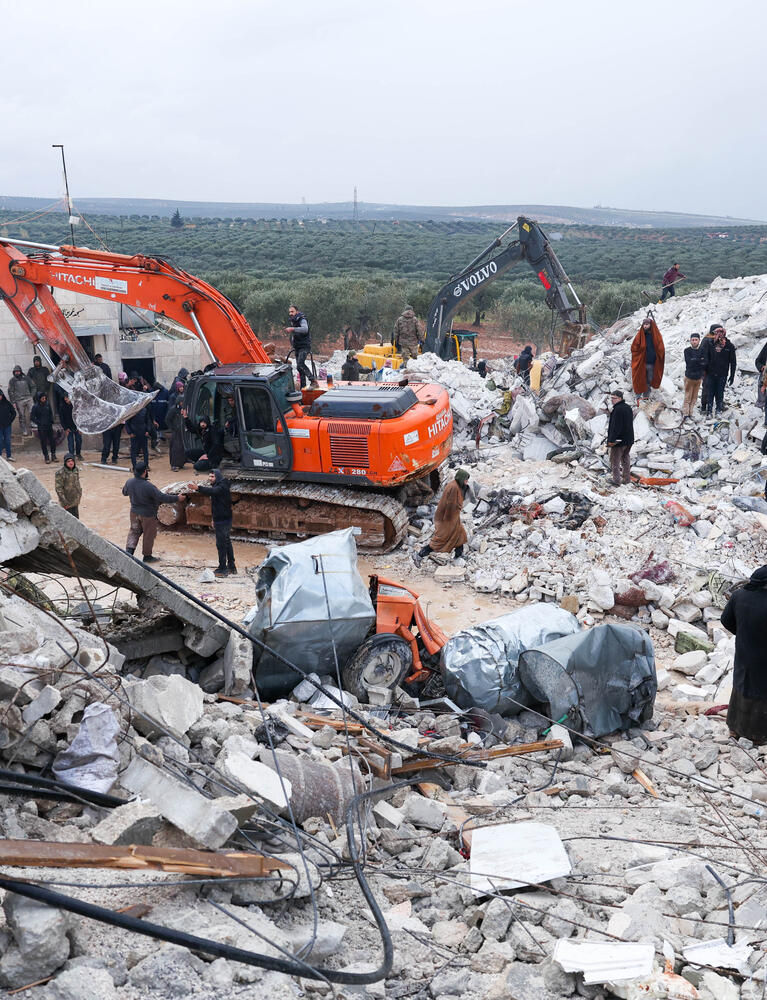(Latest update on 14th February)
Voices from the field:
- Earthquakes in Syria: "There is no time to waste in reaching the people of this region"
- Northwest Syria: I’m still shocked. I can’t come to terms with what happened
The earthquakes that struck south Türkiye and northwest Syria on 6 February have wrought devastation, resulting in a shocking number of deaths and injuries, and causing untold damage to infrastructure in both countries.
According to the latest reports, approximately 5,800 people have lost their lives in Türkiye and 1,800 people in Syria, while more than 20,000 injuries have been reported. Our teams are on hand, working around the clock to respond to the emergency. Here are four things to know about the situation on the ground...
1. Medical and relief support remain priorities
In the aftermath of the earthquake, both medical support and relief assistance are desperately needed in northwest Syria and Türkiye. While providing medical care to injured people and supporting health facilities remains a priority, immediate relief support is also vital. The collapse of buildings has left many people without shelter in very cold temperatures. Therefore, providing shelter, food, blankets, clothes, heating materials and hygiene kits remains a priority.
With at least 150,000 people becoming homeless in Türkiye, the authorities have identified shelters, non-food items distribution activities and food distribution as immediate needs.
In Syria, this disaster adds a dramatic layer for vulnerable people in the northwest of the country, who have witnessed years of ongoing humanitarian crises including war, displacement, a pandemic and a recent outbreak of cholera. The dire consequences of the earthquakes will require an enormous response from the local and international community.
2. Scaling up emergency response in Syria
In Syria, our teams treated more than 200 patients in the first hours following the earthquakes. We also opened a mobile clinic in Kelly’s reception centre, in Idlib governorate. MSF-supported health facilities in Aleppo and Idlib governorates have so far received 3,465 injured people and recorded 551 deaths. Our teams are offering support to ambulances to facilitate the transfer of patients in need of emergency assistance and have initiated first-aid activities in the facilities we’re supporting and across our mobile clinics.
In northwest Syria, we have activated an immediate response to support hospitals in Idlib and Aleppo with emergency, trauma and surgical kits, and continue to support hospitals with senior staff from our teams. MSF is currently supporting seven hospitals including a burns unit, in addition to 12 general healthcare centres in the region. We have scaled up bed capacities in our medical facilities by adding tents and dressing points.
In terms of relief assistance, we’re distributing blankets, hygiene kits and food items to target 2,500 families in Jindiris area in Afrin district, Aleppo governorate.
3. MSF ready to mobilise emergency response in Türkiye
Our emergency teams are assessing the needs in the most affected areas of southern Türkiye. Hatay, Gaziantep and Diyarbakir appear to be the most affected by the earthquakes.
We are ready to provide assistance in Türkiye and to mobilise our emergency capacities. We are currently holding discussions with the authorities and local partners to define the framework of our support.
4. Insecurity and limited access in Syria hamper response
After 12 years of war, Syria remains the country with the largest number of displaced people in the world, with 6.9 million people displaced within the country, most of whom are women and children. Our teams operate in Syria where we can, but ongoing insecurity and access constraints continue to severely limit our ability to provide humanitarian assistance that matches the scale of the needs.
Another challenge we’re facing concerns our ability to replace emergency stocks as soon as possible. This is compounded by the lack of access points to get humanitarian aid into northwest Syria.
Bab Al-Hawa remains the only humanitarian crossing between Türkiye and northwest Syria, through which essential lifesaving medical supplies can enter the region. However, the route has been compromised as roads leading to the border have been damaged. This will potentially delay the importation of humanitarian and medical aid into Syria, as almost all organisations and actors rely on this crossing for their activities.
In northwest Syria, MSF is currently supporting seven hospitals including a burns unit, in addition to 12 general healthcare centres and three ambulances for referrals. In addition, we support 11 mobile clinics serving displaced people in camps. We also run water, sanitation and hygiene activities in close to 100 camps across the northwest.
In northeast Syria, we run a general healthcare clinic, non-communicable diseases programmes, mobile wound care and a reverse osmosis plant to provide safe drinking water in Al-Hol camp. We also support a hospital, as well as an outpatient department, emergency room, nutrition programming, and currently have a team engaged in a short-term influenza B intervention in response to high child mortality.
Read more
MSF scales up response after earthquakes hit south Türkiye and northwest Syria



